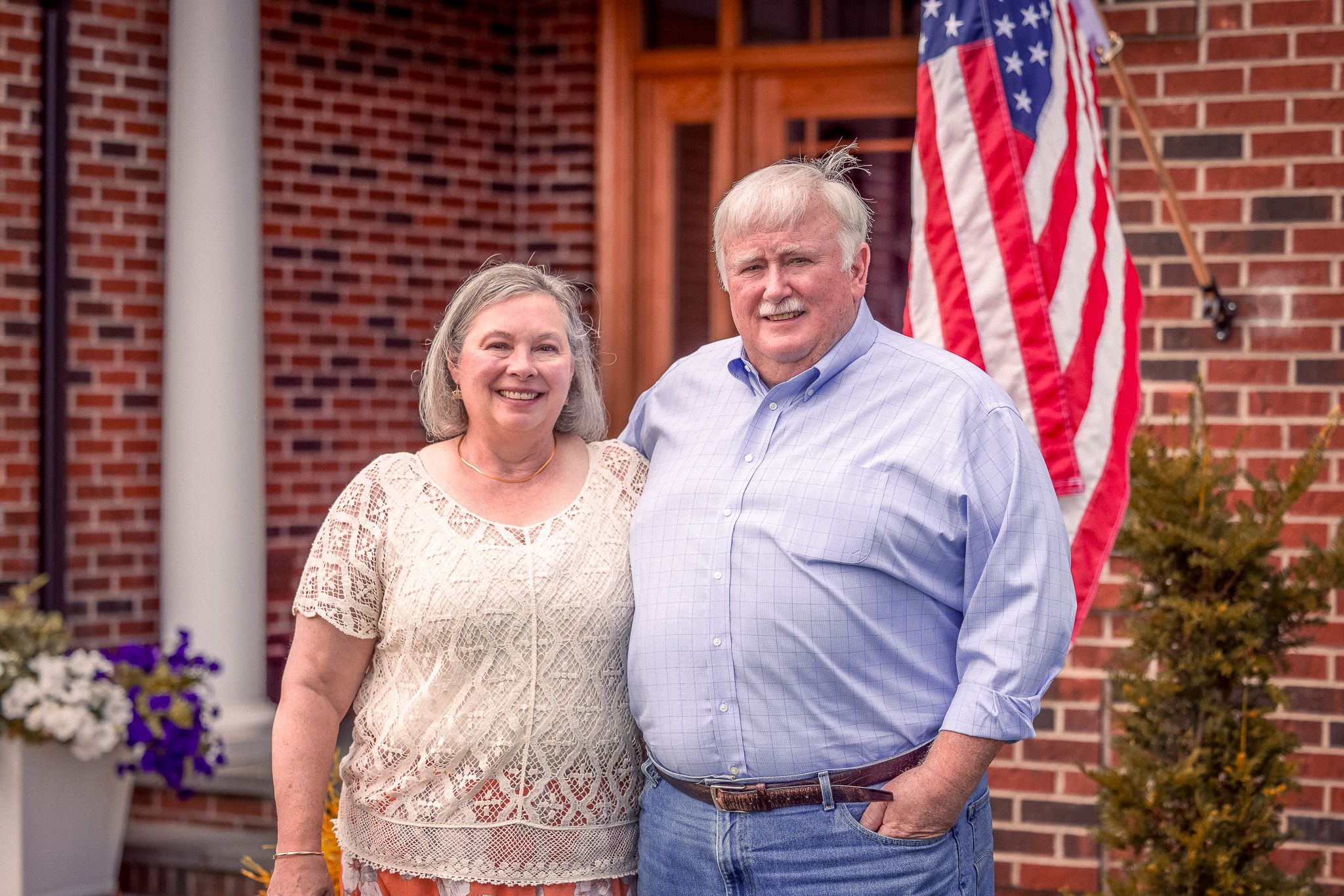
CALL OF DUTY
// By Aaron Martin (LA’94)
// Photography and videography by Gerry Robiños (T’02)
CALL OF DUTY
// By Aaron Martin (LA’94)
// Photography and videography by Gerry Robiños (T’02)
James and Cheryl McCarthy started their life together at Purdue, where they met and fell in love.
For much of the time since then, their lives belonged to the U.S. Navy.
James (NE’79) joined the Navy immediately after graduation, launching what would become a successful 28-year career that saw him rise to the rank of captain and command two ships.
Meanwhile, Cheryl (HHS’77) worked hard to balance a career in interior design with her daunting role as a military wife.
The McCarthys were forced to relocate frequently, as many military families do, and Cheryl found herself managing her career, her household, and her unofficial duties within the military community—all while James was at sea, often for months at a time.
“One thing Purdue and the Navy have in common is that they both presented us with unique challenges and impacted our lives in very profound ways,” Cheryl says. “We love them both, and they provided us with many opportunities. But there was a lot of hard work and sacrifice.”
EVER GRATEFUL

Settling in the hills outside Gettysburg, Pennsylvania, and approaching retirement, the McCarthys reflected on the roles Purdue and the military have played in their lives.
“We decided that we should do something to make things better for those who follow our path.”
The McCarthys showed their appreciation for Purdue in the form of a gift to establish the Capt. James F. McCarthy, Jr. and Cheryl E. McCarthy Head of the School of Nuclear Engineering, among other contributions to the university.
More recently, another major gift from the McCarthys established the Cheryl E. McCarthy and Capt. James F. McCarthy, Jr. Director of the Military Family Research Institute (MFRI) at Purdue.
James and Cheryl McCarthy share about the meaningful work done by MFRI.
Established at Purdue in 2000, MFRI conducts research and outreach for communities and professionals who serve military and veteran families and shapes policies, programs, and practices that improve their overall well-being. The institute also helps communities and organizations use research and best practices to achieve their goals within the military and veteran space.
The ultimate goal of MFRI is to support veterans and military families by transforming research into innovative and impactful programming.
“Being able to support MFRI and its programming, particularly the programs that address the needs of women veterans and military families—that’s very close to my heart,” Cheryl says.
“Every veteran needs assistance making the transition to civilian life, but female veterans and the families face so many challenges that nobody really sees. MFRI makes a point of seeing it all, and we really believe in the work they do. I wish there had been something like this around when I was younger.”
FOCUS FORWARD

MFRI operates at Purdue and across the country in several key program areas, including through the Focus Forward Fellowship.
Designed to help women student veterans and service members build skills and establish a sense of community with their peers, the program has in-person and online components that focus on strengths building, goal setting, leadership, communication skills, and networking. Financial assistance, professional resources, and mentorship are also among the offerings.
“Our identity as a veteran is military, and sometimes that’s all we think we are,” says Tawanay Bryant, a U.S. Army veteran who has participated in the program as both a fellow and a mentor.
“MFRI helps remind veterans who they are,” Bryant says. “We are naturally givers, and we were taught to be selfless. That becomes a fault at times—we forget that we are people, too. That we also need work to build into the next-level person we can be.”
Tawanay Bryant shares how the Focus Forward Fellowship helped her build confidence.
“This program has shown me that I am truly more than a veteran. It shined light on me and made me proud to be a woman.”
Alicia Fuller, a U.S. Air Force veteran and Focus Forward Fellowship participant, also found answers—and a feeling of hope—through the program.
“I think the thing that surprised me the most about MFRI is that it’s not some massive program that’s built for robots,” Fuller says. “Here, they understand. They’re here to help in so many ways—they’re actually fixing all the traumas we’ve been through and helping us move forward.”
Alicia Fuller shares the impact of finding a community through the Focus Forward Fellowship.
“These are people who actually care. They let you know that you don’t have to do this alone—that’s the biggest thing.”
MAKING LIVES BETTER

MFRI provides numerous award-winning opportunities, including the Measuring Communities, Star Behavioral Health Providers, and Reaching Rural Veterans programs.
The institute also performs outreach and engagement through the Battlemind to Home Summit and the Barbara Thompson Excellence Award competition.
All of the programs are designed with one thing in mind—making lives better, one veteran at a time.
“We feel that supporting MFRI was a great way to give back to both Purdue and our military family,” James says.
“People often say, ‘Thank you for your service,’ and that’s important because it acknowledges the sacrifices our veterans have made. Contributing to MFRI and its much-needed programming puts those words into action.”
MFRI welcomes contributions of any size, but a recent funds-matching grant has created a unique opportunity for anyone interested in supporting the institute to double the impact of their gift.
To learn more, visit the Purdue for Life Foundation’s MFRI giving page.
